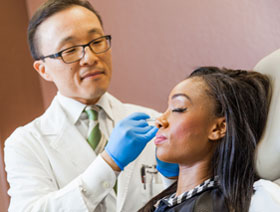 As athletes, you push your bodies to the limit, striving for peak performance. While you focus on physical conditioning, it’s essential not to overlook the health of your skin, your body’s largest organ. The combination of intense physical activity, exposure to the elements, and frequent use of sports gear can pose unique challenges to your skin. Understanding these challenges and adopting appropriate skincare strategies can help you maintain skin health, an often-overlooked part of athletic performance. Here are some specialized skincare considerations and tips tailored for athletes:
As athletes, you push your bodies to the limit, striving for peak performance. While you focus on physical conditioning, it’s essential not to overlook the health of your skin, your body’s largest organ. The combination of intense physical activity, exposure to the elements, and frequent use of sports gear can pose unique challenges to your skin. Understanding these challenges and adopting appropriate skincare strategies can help you maintain skin health, an often-overlooked part of athletic performance. Here are some specialized skincare considerations and tips tailored for athletes:
Hydration is Key
Intense workouts and prolonged exposure to the sun can lead to significant fluid loss through sweating, which can dehydrate your skin. During physical activity, individuals can lose up to 2 quarts of fluid per hour, accompanied by the loss of salt. Endurance activities like distance running, intense hiking, and bicycling can escalate this loss, leading to a potential drainage of up to 3 quarts of fluid per hour. Ensure adequate hydration by drinking plenty of water or sports drinks containing electrolytes before, during, and after exercise. Additionally, using a moisturizer with hydrating ingredients such as hyaluronic acid can replenish lost moisture and help maintain skin elasticity.
Sun Protection
Outdoor athletes are particularly susceptible to sun damage due to prolonged sun exposure. Protect your skin by applying a broad-spectrum sunscreen with an SPF of at least 30, even on cloudy days. Reapply every two hours, especially if you’re sweating heavily or swimming. Don’t forget commonly missed areas like the ears, back of the neck, and tops of feet.
Preventing Chafing and Friction
Friction from clothing, equipment, or repetitive movements can lead to chafing and skin irritation, commonly known as “sports dermatitis.” To prevent this, wear moisture-wicking, breathable fabrics and properly fitted gear to minimize friction. Applying a thin layer of petroleum jelly or anti-chafing balm to areas prone to irritation can create a protective barrier and reduce friction. If you are prone to eczema, you may need to take additional precautions.
Fungal Infections
Athletes, especially those involved in sports with shared equipment or in humid environments, are at increased risk of fungal infections like athlete’s foot and ringworm. Keep feet clean and dry, change socks frequently, and wear moisture-wicking socks and breathable shoes. Use antifungal powders or sprays as a preventive measure, especially if you’ve had fungal infections in the past.
Acne Management
Sweat, heat, and occlusive gear can contribute to acne breakouts, commonly termed “acne mechanica.” To prevent this, shower promptly after workouts to remove sweat and oil buildup. Use a gentle cleanser and avoid harsh scrubbing, which can exacerbate irritation. Non-comedogenic moisturizers and oil-free sunscreen can help prevent pore clogging.
Proper Wound Care
Cuts, scrapes, and blisters are common among athletes and can become infected if not properly treated. Cleanse wounds with mild soap and water, apply an antiseptic ointment, and cover with a sterile bandage or dressing. Change dressings regularly and seek medical attention for deep or infected wounds.
Nutrition for Skin Health
A balanced diet rich in vitamins, minerals, and antioxidants is essential for overall skin health. Include foods high in omega-3 fatty acids (such as fish, flaxseeds, and walnuts) to support skin hydration and reduce inflammation. Antioxidant-rich foods like fruits, vegetables, and green tea can help protect against oxidative stress from intense exercise.
Rest and Recovery
Adequate rest and recovery are vital for skin repair and regeneration. Ensure you’re getting enough sleep each night to allow your body, including your skin, to recover from the stresses of training. Incorporate rest days into your training schedule to give your skin a chance to heal and rejuvenate.
Sport-specific skin care recommendations
Depending on the type of sport you practice, it may be prudent to exercise additional skin care tips.
- Chlorine in swimming pools can strip the skin of its natural oils, leading to dryness and irritation. Before entering the pool, apply a layer of petroleum jelly or a waterproof barrier cream to create a protective barrier. After swimming, rinse off with fresh water and moisturize immediately to replenish lost moisture. Consider using a swimmer’s shampoo and conditioner to remove chlorine from your hair and skin.
- Team Sports (e.g., Soccer, Basketball, Football).Contact sports increase the risk of skin injuries such as turf burns, abrasions, and impact-related bruises. Wear protective gear such as shin guards, knee pads, and compression sleeves to minimize the risk of injury. After games or practices, promptly clean and disinfect any wounds to prevent infection. Moisturize regularly to maintain skin integrity and resilience.
- Gymnastics and Dance. Athletes in gymnastics, dance, or other activities that involve repetitive movements and contortions may develop skin conditions like calluses, blisters, and friction-related injuries. Use protective padding or gloves to cushion pressure points and reduce friction. Treat blisters with sterile dressings and avoid popping them, as this can increase the risk of infection.
- Outdoor Sports (e.g., Skiing, Snowboarding, Surfing). Outdoor enthusiasts participating in activities like skiing, snowboarding, or surfing are exposed to harsh environmental conditions such as cold temperatures, wind, and UV radiation. Wear appropriate protective clothing, including sunscreen, lip balm with SPF, and goggles or sunglasses with UV protection. After outdoor activities, cleanse your skin thoroughly to remove sweat, salt, and environmental pollutants, and apply a rich moisturizer to prevent dryness and irritation.
By incorporating these skincare strategies into your routine, you can protect your skin from the rigors of athletic training and maintain its health and performance. Remember, healthy skin isn’t just about aesthetics—it’s essential for your overall well-being and athletic success. If you have specific concerns or persistent skin issues, don’t hesitate to consult one of our dermatologists for personalized advice and treatment. Your skin deserves the same attention and care as the rest of your body.


